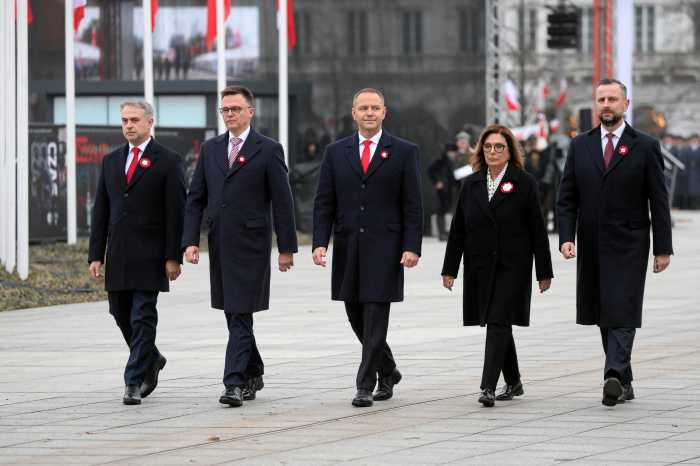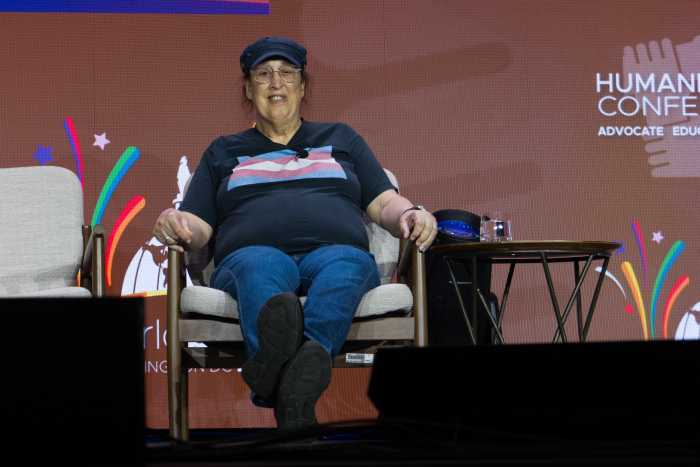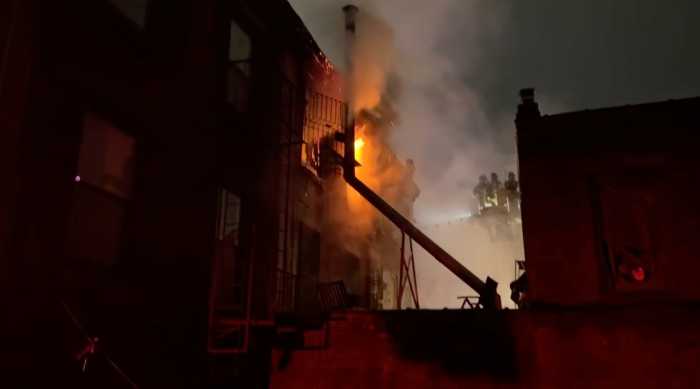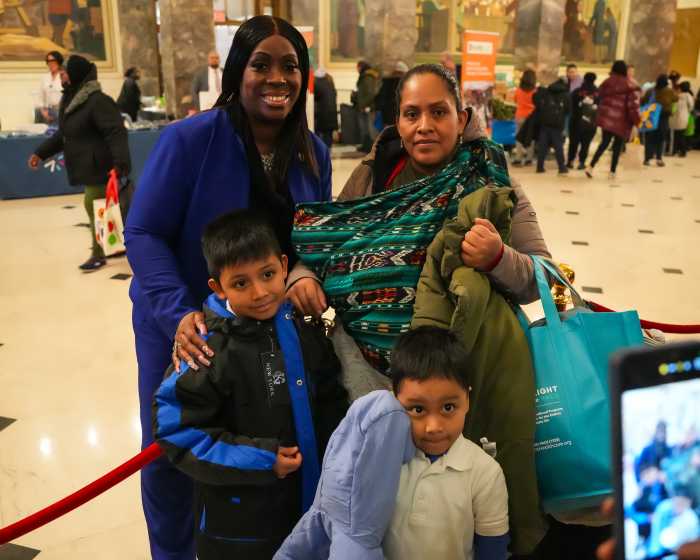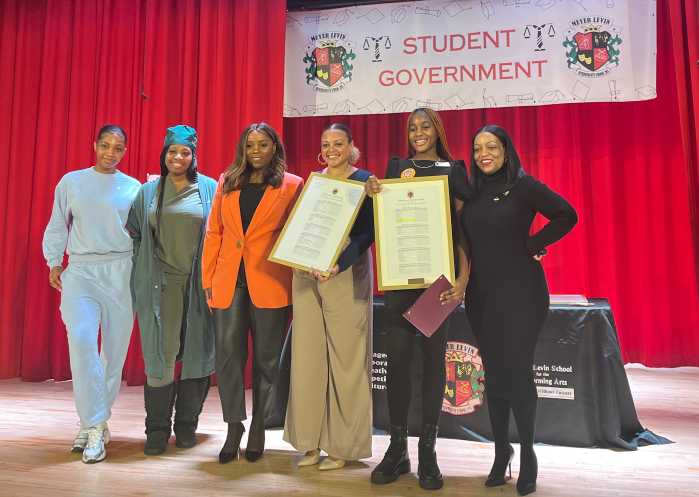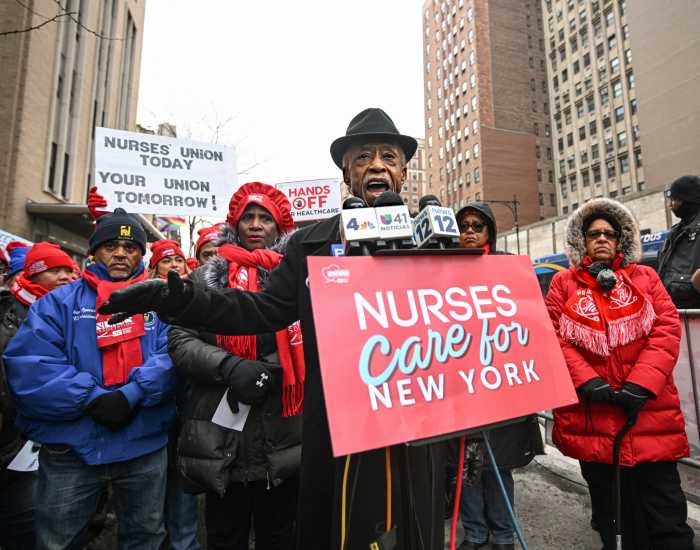For the fourth year in a row, an attempt to have a Moscow Gay Pride March was violently broken up by police on Saturday, May 16, and 40 LGBT activists were arrested. Still, Pride organizers claimed a propaganda victory.
“Our goal was to have the maximum visibility with the minimum damage to activists,” Nicolai Alexeyv, the 33-year-old lawyer who has been the lead organizer of these Moscow Pride events since their inception, told Gay City News by telephone from Moscow. “By careful planning, we cheated the police, obtained a huge amount of publicity for LGBT rights in Russia, avoided the homophobic thugs who were staging a counter-demonstration, and did so with no serious injury to anyone.”
The Pride March had been banned by Moscow's homophobic authoritarian Mayor Yuri Luzhkov, who has called such marches “Satanic” and recently dubbed gays “weapons of mass destruction.” Luzhkov's press spokesman, Serge Tsoi, told Russia's Novosti press agency just prior to the Pride March, “The Moscow government is declaring that there never has been and never will be a gay parade in Moscow,” adding that such events are “aimed at destroying not only the moral foundations of our country but deliberately provoking disorder threatening the lives and security of Moscovites and guests to the capital.”
Novosti also reported that “the Russian Orthodox Church and various far-right groups vowed to halt any attempts to hold a march in support of gay rights in Russia.”
A police plan to sabotage the Pride March by staging a preventive arrest of lead organizer Alexeyev was foiled when the courageous young lawyer slept in different locations every night for the week preceding the event and continually changed the cell phones he was using.
Similarly, Alexeyev and the other Pride organizers had originally announced the location of the demonstration as Moscow's Novopushkinsky Skver (New Pushkin Square), but changed the actual location at the last minute to Vorobyovy Gory, a scenic garden near Moscow State University that is a popular site for wedding photographs.
To further mislead the police, Alexeyev told Gay City News, “I stayed separate from the main group and arrived in a limousine with others disguised as a wedding party, and showed up with a comrade trans activist from Belarus who was in a wedding dress. When the many journalists and TV crews we'd alerted spotted me and crowded around me, this diverted the attention of the police, and allowed our buses carrying the main body of demonstrators to disembark and unfurl their banners.” Alexeyev was thrown to the ground by five burly police officers, then he and his “bride” were carried into a police van.
There were a total of some 80 demonstrators, Alexeyev said, “including some from cities all over Russia, like Yekaterinburg, Rostov, Krasnodarsk, Volgodarsk, Minsk, Ryazan, and Sochi.” Among them were a handful of older veterans of the underground Russian gay rights movement of the 1980s, including a member of Russia's Academy of Sciences and a nuclear physicist. Billed this year as “Slavic Pride,” the demonstrators included a contingent of 15 LGBT activists from the neighboring ex-Soviet republic of Belarus.
The demonstration was conducted in waves. First, the Belarus contingent arrived chanting “Homophobia is a disgrace! ” After half of them were arrested and dragged away by the police, another contingent unfurled a 25-foot banner reading “Gay Equality, No Compromise!”
Dozens of the dreaded, thuggish OMON riot police who had appeared on the scene chased the LGBT contingents through the gardens, dragging some of the demonstrators unnecessarily through prickly hedges, and violently arrested half of them, including two Westerners who'd come to Moscow in solidarity with the Russian activists.
Britain's best-known gay activist, Peter Tatchell, head of the militant gay rights agit-prop group OutRage!, was thrown to the ground, and later said he'd been handled with “unnecessary violence, my arm was twisted behind my back and my wrist was twisted until it hurt.”
At the 2006 Moscow Pride, Tatchell was violently attacked and beaten on his head by homophobic thugs acting in collusion with the police; he still is suffering the after-effects of that beating, including bouts of vision problems and short-term memory loss — which made Tatchell's willingness to risk another beating in Moscow all the more courageous. Tatchell was arrested and detained, but released after a British Embassy official showed up at the police station.
Also arrested was an American gay activist, Andy Thayer of Chicago's Gay Liberation Network.
Alexeyev told this reporter that “police beat the demonstrators unnecessarily and used disproportionate violence. Fortunately, this time there were no serious injuries.”
At the police station, Alexeyv said, he and the activists from Belarus were detained seperately from the other demonstrators, most of whom were released the same day after paying a fine, while Alexeyev and the half-dozen Belarus activists were kept in jail overnight in what the Pride organizer described as “simply dreadful conditions. We were very cold, as the jail cell's window was broken, and we were not given blankets. Nor could we sleep, because there were only hard benches to sit on. Then, the police put a number of very drunk homeless people into our already-cramped cells, who urinated in our water bottle and made the detention even more unbearable.”
Alexeyev related that he was interrogated for nine straight hours without a letup. “There was no violence used, but instead an enormous amount of psychological pressure,” he said. “The police used every homophobic insult imaginable, saying that we were pedophiles, zoophiles, child molesters, and using every single vicious slang epithet for gay in the Russian language.”
In addition, Alexeyev told Gay City News, “My lawyer was not allowed to see me when he came to the police station, and they illegally confiscated my cell phone. They tried to get me to name the names of my collaborators, and they downloaded and copied every name and address in my cell phone's electronic address book. They demanded where we got our financing. They asked me for the names of other prominent gays in politics and show business. I replied only that there were too many to name!”
Alexeyev was eventually released after more than 24 hours of sleepless detention, and is scheduled to appear in court on May 26 on a charge of “organizing an unlawful demonstration.” This is the fourth time the young lawyer has been arrested for holding a gay rights protest.
Although admitting in response to a question from this reporter that he was “extremely exhausted” by the events of the preceding weeks, he proclaimed himself happy at the results of this year's Pride activities.
“We garnered a huge amount of publicity, more than in any previous years, which helped bring the cause of Russian LGBT people to the attention of more and more of our fellow citizens,” Alexeyev said. “The principal goal of the police was to prevent images of the Pride and of its repression from being televised in other countries, and while I'm still catching up on all the news reports we know that indeed our protest was filed and broadcast throughout the world, especially in Europe.”
The Pride protest was timed to coincide with the annual Eurovision song contest, which this year was held in Moscow on the day of the gay demonstration. Eurovision is a major show business event, televised throughout Europe, and it attracts a large gay following.
According to the British daily the Guardian, Russian authorities had spent an unprecedented $37 million to host this year's Eurovision contest.
Alexeyev told the journalist from the Guardian and other reporters as he was being arrested, “The Russian government is using this year's Eurovision in Moscow as a gala showpiece to show the world how far the country has improved since the early 1990s. What we witnessed this afternoon on the streets of Moscow shows the world just how little Russia has traveled in respect of fundamental human rights.”
The British Daily Telegraph reported that advance questions about the threats of a police crackdown on the Pride March drew “an embarassed silence” from the host of this year's Eurovision, openly gay television personality Graham Norton — whose show “The Graham Norton Effect” appears on the US gay television network Logo — and from Andrew Lloyd Weber, who composed the UK entry song, “It's My Time,” for Britain's Eurovision contestant, singer Jade Ewen. Both show business figures professed ignorance about the tough line taken by the Moscow authorities against the gay rally.
“I feel really bad, but I don't know very much about this,” the Guardian quoted Norton as saying just before the Pride March. Lloyd Webber also said he knew little about it, saying only that it was “probably a matter of security” or “might have been banned to avoid traffic congestion,” the Telegraph reported.
Alexeyev told Gay City News that this year, Russian media coverage of the Pride events was “not only much more widespread, in that every newspaper carried an account of the events,” but that “the coverage was more neutral and positive and less homophobic” than in previous years, and that's a big change. This shows the positive effect our militant public agitation is having in fighting homophobia.”
The Moscow march was only part of the events organized by Alexeyev and his comrades in connection with the International Day Against Homophobia, celebrated in over 50 countries in commemoration of the day in 1993 when the World Health Organization removed homosexuality from its list of mental disorders.
“We also had a conference in the days before the Pride which drew some 80 people and was held at a location about 70 kilometers outside of Moscow, and there was also the attempted marriage of two lesbians we'd organized on May 12,” Alexeyev told this reporter.
On that day, the two lesbians, Irina Fedetova, 32, and Irina Sjipitiko, 30, showed up at the Tverskoi Moscow branch of the State Marriage Registry Office in matching tuxedos to register their marriage, but were sent packing by the chief registrar, Svetlana Potamoshneva, who told them that the Family Civil Code states only that marriage requires the consent of “a man and a woman.” In any case, said the registrar, the official form only had sections for “he” and “she.” Alexeyev, who had accompanied the two lesbians, then persuaded the registrar to consider a request to register the marriage written on a blank piece of paper.
Later, Alexeyev and the lesbian couple posed for photographs and answered questions before a swarm of journalists in front of the registry office, and the event was widely publicized throughout Russia.
Alexeyev has four lawsuits pending before the European Court of Human Rights in Strasbourg to overturn bans on Moscow Pride and other gay demonstrations on the grounds of freedom of assembly, one case before the United Nations Committee on Human Rights, and seven more cases are still in the Russian courts, he told Gay City News.
Doug Ireland can be reached through his blog, DIRELAND, at http://direland.typepad.com/.

